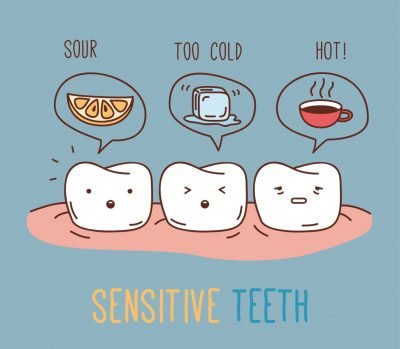Have you ever taken a spoonful or bite of ice cream and found it was painful and hurt your teeth? If that is the case, you have cold sensitive teeth. There are two categories of cold tooth sensitivity (or intolerance).
The first kind of cold tooth sensitivity is plaque induced and eventually leads to tooth decay or gum disease. Sensitivity caused by tooth decay and gum disease often deteriorates to pain even when not drinking or eating a cold food or beverage such as ice cream or iced tea. With plaque build up on your teeth, tooth sensitivity, tooth decay and gum disease go hand in hand. In other words, plaque is a major contributor to cold sensitive teeth.
Cold sensitive teeth are also attributed to excessive brushing, consumption of large amounts of acidic foods, and an overuse of whitening products. If you brush teeth too strongly, you risk grinding your tooth enamel away. Brushing gently with a soft brush will help to prevent the erosion of tooth enamel.
Acidic foods include highly nutritious foods such as oranges and tomatoes and low nutritional foods such as coffee and carbonated beverages; rinse your mouth with water after ingesting such items and do limit consumption of the low nutrient foods. Finally, whitening products often contain harsh abrasive particles that can grind away tooth enamel over time, leaving the deeper layer of teeth exposed.
What is the mechanism of tooth sensitivity? The common denominator with both kinds of tooth sensitivity is tooth surface erosion with resultant exposure of the “dentin” and nerves under your teeth. Those nerves are highly sensitive . Biting forces, contact with foods, and very cold foods like ice cream can stimulate them and cause pain.
WHAT TO DO FOR SENSITIVE TEETH? WHEN SHOULD YOU SEE A DENTIST?
If you have sensitive teeth you can try using desensitizing toothpaste that contains ingredients to limit tooth pain. If you experience tooth sensitivity that does not go away within a few days, then schedule an appointment to have your teeth checked by a dentist. Long-term sensitivity can be a symptom of more serious oral health problems. In general, get attention to your teeth as soon as possible to prevent worsening of cavities, gum disease, and further damage.
WHAT CAN A DENTIST DO FOR YOUR SENSITIVE TEETH?
There are two ways to treat sensitive teeth: either create a physical barrier to the exposed nerve endings or make the nerves less irritable. A dentist can immediately alleviate tooth pain due to cold sensitivity. They can apply sealant to close cracks in your teeth and prescribe special gels and toothpaste containing fluoride and desensitizing agents to limit pain. Please contact our office today at 519-305-9100 to make an appointment to begin the treatment for your sensitive teeth.

